The Portland region’s top Oregon Department of Transportation official has left his post and taken a job with a private company. Jason Tell, who has spent 18 years with ODOT — eight of them as Region 1 Director — is now the Senior Planning Manager at the downtown Portland office of Parsons Brinckerhoff.
ODOT has named Planning and Development Manager Rian Windsheimer as the interim Region 1 Director.
In his new role, Tell will manage projects throughout the region. He’ll also, “Advise and guide public agencies on funding, public and political support, policy issues and implementation strategies for complex transportation projects.”
When we asked Tell what has changed at ODOT in the last 18 years, he said, “In particular, a greater focus on all modes of transportation, engaging with the community and groups that weren’t always brought in on ODOT plans and projects, and organizational change.”
While we certainly disagreed with some of Tell’s positions over the years (most notably his his staunch opposition to a road diet on SW Barbur), we also appreciated much of the work he oversaw.
Advertisement
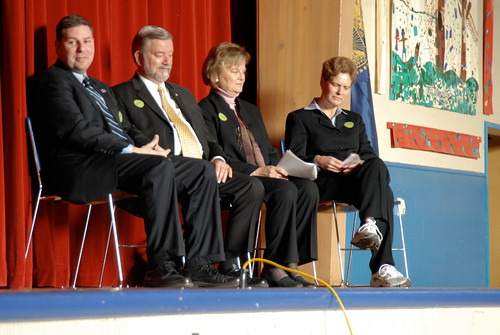

Tell was an ardent supporter of improving safety on our region’s roads. In 2009 he floated an amendment to the Regional Transportation Plan that was sort of a step in the direction of Vision Zero. He also helped shepherd the Gateway Green project from a twinkle in a developer and activist’s eye into a full-fledged, State of Oregon priority. In fact, one of his last acts as Region 1 Director was to officially sign over ownership of 19 acres of the property (adjacent to I-205) from ODOT to the City of Portland.
In October 2008, one year after the death of Brett Jarolimek ripped through our city, Tell said the tragedy made such an impact on him that he went to bat for a permanent memorial to be built on a wall of the overpass where the collision took place (it was never built, but not for lack of support from ODOT or Tell).
Of all the events and meetings I saw Tell at over the years, by far the happiest and most animated I’d ever seen him was at the 2013 Policymakers Ride. Dressed in his stylish biking shirt and shorts, Tell spoke at the trail head of a new section of the Historic Columbia River Highway State Trail and called its dedication “a huge milestone” that’s “worth every penny.”
Given his new role, I have a hunch we haven’t heard the last of Tell. And, given his track record at ODOT, that’s not such a bad thing.
Good luck Jason!



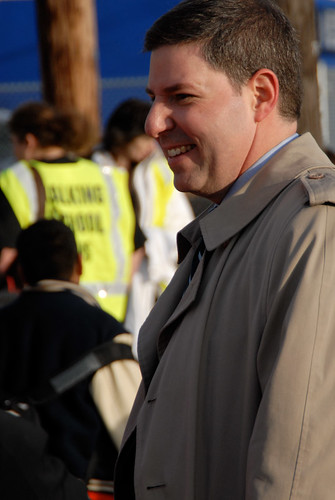
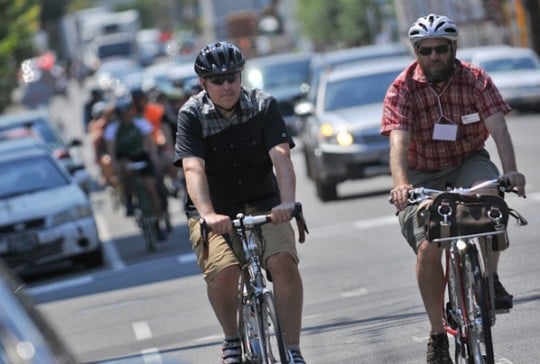
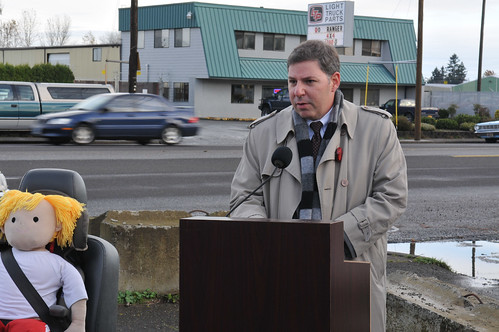
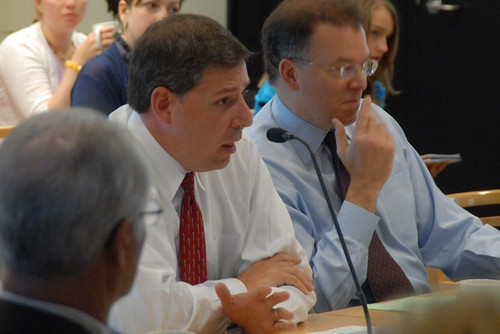
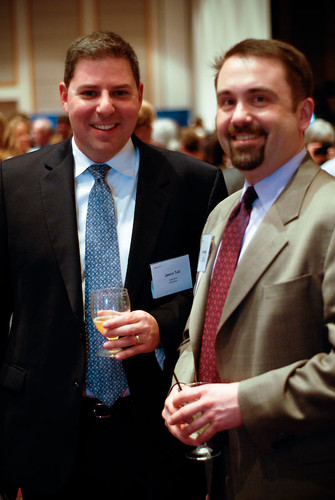
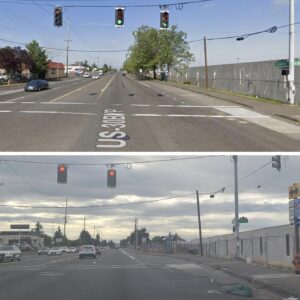

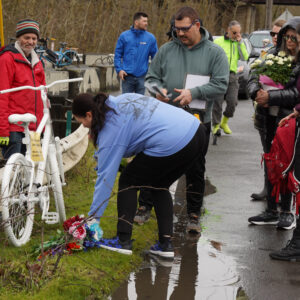

Thanks for reading.
BikePortland has served this community with independent community journalism since 2005. We rely on subscriptions from readers like you to survive. Your financial support is vital in keeping this valuable resource alive and well.
Please subscribe today to strengthen and expand our work.
It’s interesting that Jason understands the importance of safety improvements but never wanted to improve the death trap known as Barbur even when it continues to cost our neighbors their lives. I wish we knew what his thought process was.
Like anyone in his position, his thought process probably has a large layer of politics wrapped around it… and therefore it will probably always remain quite opaque.
Yeah. The never-stick-your-neck-out rule of working in a bureaucracy seems to often interfere with doing the right thing, the sensible thing, the prudent thing.
“It’s interesting that Jason understands the importance of safety improvements but never wanted to improve the death trap known as Barbur even when it continues to cost our neighbors their lives. I wish we knew what his thought process was.”
I wonder if some of the explanation is that it is easy and even strategic to *say* the word safety a lot. But when it comes to actually taking the steps necessary to do something about it, suddenly it is much more important to talk about the need for further study, the potential for increased travel times, reduction in auto capacity, the lack of crash data for a particular, narrowly defined location, etc….
I have to say that the Barbur thing was a real eye-opener for me about who our friends are, when they choose to spend (or save up) their political capital. We argued back in October about why Tell & Co. were so stubbornly refusing to do what a lot of constituents were asking them to do. I still think it boils down to institutional mindsets, inherited thinking within ODOT:
Past Highway/ODOT Slogans:
1913 – “Get Oregon Out of the Mud”
1957 – “Building Oregon Thru Better Highways”
1958 – “Oregon Freeways…Symbol of 2nd Century Progress”
1961 – “Freeways are Easier”
1967 – “Fifty Years of Building Better Highways in Oregon”
1978 – “Keep Oregon Green and in the Black”
1986 – “ODOT on the Move”
http://www.oregon.gov/ODOT/CS/pages/bss/historycenter.aspx
So, a mixed but more good than bad influence, maybe a grade of C+ or B? What are the chances that his replacement will be better for alternative modes of transportation?
where do you sign the jessica horning for new ODOT director letter?
So, now he works for a freeway-construction lobbying firm. Let’s see how this turns out.
Not a lobbying firm, a consulting firm with engineers, designers, planners etc. They do design roads, freeways, rail systems, water systems and they do planning on the mega scale. Although not associated with PB, I am confident there is important work benefiting the environment and sustainability. It is to be expected that purists will deride PB for work they do to serve the world as it exists, rather than spending their time designing utopia. Until utopians start putting up some serious money the pace of change will be slow.
That being said, one can be confident that their muckity mucks are talking with agency leaders
Tell spoke at the trail head of a new section of the Historic Columbia River Highway State Trail and called its dedication “a huge milestone” that’s “worth every penny.”
vs.
his staunch opposition to a road diet on SW Barbur
It is unhelpful to always and predictably endorse (and fund) the recreational bike infrastructure, while at the same time undermining prospects for transportational infrastructure where it matters. I’ve long felt that at least in the political realm allowing the unqualified association of bicycles with recreation does us a disservice. Here Tell gets points for endorsing a trailhead (who uses this and for what purposes?) while at the same time torpedoing bike infrastructure for commuters on Barbur.
Recreational cycling is great, and infrastructure improvements there are appreciated, but since ODOT has wasted so much of our money on, among other things, studying the CRC that it appears we now can’t have both, I, for one, am not satisfied with the way ODOT ranks these different projects, defends its decisions to scuttle Barbur’s prospects for bicycling.
> It is unhelpful to always and predictably endorse (and fund) the recreational bike infrastructure, while at the same time undermining prospects for transportational infrastructure where it matters.
Great point. I’ve noticed the same thing in Washington County, where there is support (from Nike and perhaps the Westside Economic Alliance) for bike trails (which, in their defense, can serve a transportation purpose) but just as much support for insanely wide, unsafe, and uncomfortable roads (which the trails then have to cross or exit on to at their ends).
the bikes are for kids and for folks who want to explore beautiful places notion is a holdover from an earlier, even more car-dominated, period in our history. Times have moved on, but the thinking in many places, including ODOT, has not. ODOT staff don’t, by and large, get to work or take car of their business on bikes; the people they associate with after work probably also drive for the most part. This colors their view of how serious of a thing bicycling is. Whether it is the shoulder repaving screwups, the paternalistic, finger-wagging manuals they print for people cycling, the campaigns to wear fluorescent patches, or their disdain for the demands around Barbur, it boils down to a failure to take seriously bicycles as transportation, as something they themselves or their peers would use to get to where they need to go.
I think it is up to us to help them with their failure of imagination, insist that they stop thinking this is still the Cold War, Cars Über Alles.
wsbob will probably say, but only 7% of people commute by bike; see ODOT’s right to only devote 7% of their Metro area resources to this. To which I’ll preemptively reply: This is a static view of things. We all know that if ODOT gets out of the way, the modeshare of people who are *not* in cars can and eventually will skyrocket. No one is seriously thinking that the current auto-mode-share can increase. So let’s think about this dynamically; help bring about a future that will improve things for everyone, even those who can’t bring themselves to jettison the car quite yet.
Yes! This exactly is why I’m cool to negative towards Sunday Parkways.
The first Policy issue he can address is Les Schwabs insistence that studded tires are needed in Oregon and/or that they shouldn’t have to pay a fee of any kind. That’s the elephant in the room everyone is afraid to talk about in public.